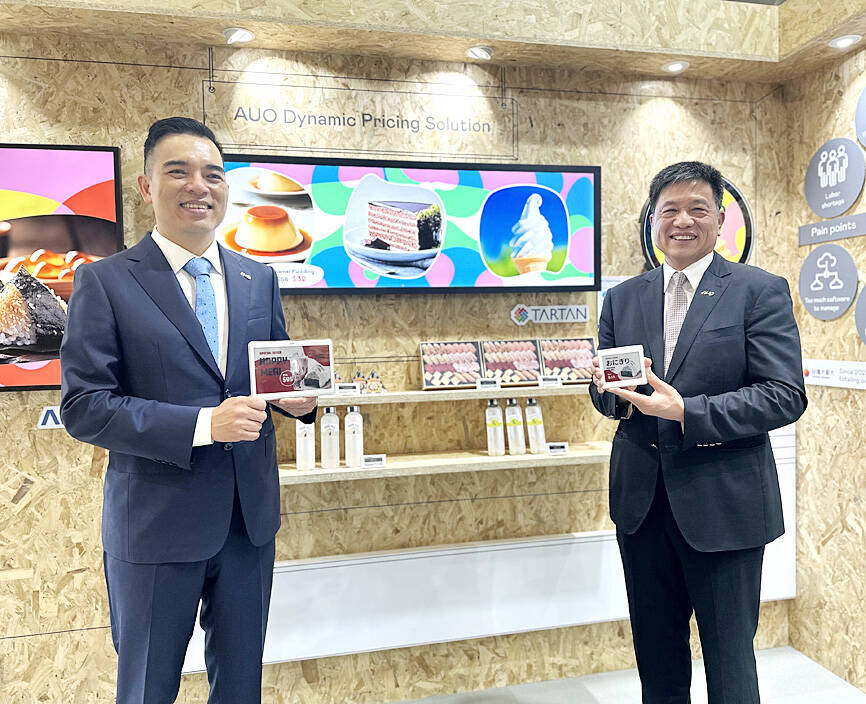Flat-panel display supplier AUO Corp’s (友達) losses last quarter narrowed to NT$3.53 billion (US$108.48 million) from NT$10.91 billion a year earlier, thanks to restocking demand from TV vendors in preparation for major global sports events such as the Paris Olympics and UEFA Euro 2024 in the second half of the year.
However, the Hsinchu-based company’s losses increased from NT$1.51 billion in the fourth quarter of last year. That translated into losses per share of NT$0.46 last quarter, an improvement from losses of NT$1.42 a year earlier, but worse than losses per share of NT$0.2 a quarter earlier.
Operating losses last quarter improved to NT$4.94 billion from NT$5.07 billion a quarter earlier and NT$11.14 billion a year earlier.

Photo: Chen Mei-ying, Taipei Times
“We maintain our outlook for this year. The first quarter was the bottom,” AUO chairman Paul Peng (彭?浪) told a virtual investors’ conference yesterday. “Businesses are returning to the normal seasonal cycles.”
AUO expects a gradual recovery each quarter for the remainder of the year, first thanks to a boost from TV vendors who last quarter began restocking for the high season, Peng said.
The introduction of artificial intelligence (AI) PCs from the middle of this year would fuel new growth momentum, he added.
As a result, shipments this quarter would increase by a low-to-mid-single-digit percentage sequentially, AUO said, adding that average selling prices would grow by a low-single-digit percentage quarter-on-quarter.
Aside from an improvement in its core flat-panel display business, AUO expects revenue from total solutions for automotive and other vertical industries to increase this quarter, following its acquisition of Behr-Hella Thermocontrol GmbH (BHTC), a German supplier of auto cockpit components, for 600 million euros (US$643.7 million).
Revenue from AUO’s non-display business, or the total solutions for vertical industries, would make up 20 percent of total revenue this quarter, Peng said.
In the long run, the firm aims to boost its revenue contribution from automotive solutions — mostly smart cockpits — to 25 percent, AUO chief executive Frank Ko (柯富仁) told investors.
Last year, automotive business made up about 17 percent of the company’s total revenue, it said.
Excluding BHTC, AUO expects its automotive business revenue to increase by a double-digit percentage to more than NT$50 billion this year from NT$44 billion last year, maintaining a similar pace of growth to what it has experienced since 2022, Ko said.
A greater revenue contribution from auto parts would be crucial for AUO to mitigate the volatility of its profitability caused by the boom-and-bust nature of the display industry, Ko said.
Auto components tend to have a longer order visibility and deliver stable profits, Ko said.
AUO said it is making good progress on commercializing its microLED technology, which is considered cost-efficient and should enable local display companies to compete with OLED technology, which is dominated by South Korean firms.
The company said it expects to see microLED displays used in large TVs and vehicle displays in the next two or three years.
AUO began shipping microLED displays for smart watches at the end of last year and expects volume to grow this year.

SEEKING CLARITY: Washington should not adopt measures that create uncertainties for ‘existing semiconductor investments,’ TSMC said referring to its US$165 billion in the US Taiwan Semiconductor Manufacturing Co (TSMC, 台積電) told the US that any future tariffs on Taiwanese semiconductors could reduce demand for chips and derail its pledge to increase its investment in Arizona. “New import restrictions could jeopardize current US leadership in the competitive technology industry and create uncertainties for many committed semiconductor capital projects in the US, including TSMC Arizona’s significant investment plan in Phoenix,” the chipmaker wrote in a letter to the US Department of Commerce. TSMC issued the warning in response to a solicitation for comments by the department on a possible tariff on semiconductor imports by US President Donald Trump’s

‘FAILED EXPORT CONTROLS’: Jensen Huang said that Washington should maximize the speed of AI diffusion, because not doing so would give competitors an advantage Nvidia Corp cofounder and chief executive officer Jensen Huang (黃仁勳) yesterday criticized the US government’s restrictions on exports of artificial intelligence (AI) chips to China, saying that the policy was a failure and would only spur China to accelerate AI development. The export controls gave China the spirit, motivation and government support to accelerate AI development, Huang told reporters at the Computex trade show in Taipei. The competition in China is already intense, given its strong software capabilities, extensive technology ecosystems and work efficiency, he said. “All in all, the export controls were a failure. The facts would suggest it,” he said. “The US

The government has launched a three-pronged strategy to attract local and international talent, aiming to position Taiwan as a new global hub following Nvidia Corp’s announcement that it has chosen Taipei as the site of its Taiwan headquarters. Nvidia cofounder and CEO Jensen Huang (黃仁勳) on Monday last week announced during his keynote speech at the Computex trade show in Taipei that the Nvidia Constellation, the company’s planned Taiwan headquarters, would be located in the Beitou-Shilin Technology Park (北投士林科技園區) in Taipei. Huang’s decision to establish a base in Taiwan is “primarily due to Taiwan’s talent pool and its strength in the semiconductor

French President Emmanuel Macron has expressed gratitude to Hon Hai Precision Industry Co (鴻海精密) for its plan to invest approximately 250 million euros (US$278 million) in a joint venture in France focused on the semiconductor and space industries. On his official X account on Tuesday, Macron thanked Hon Hai, also known globally as Foxconn Technology Group (富士康科技集團), for its investment projects announced at Choose France, a flagship economic summit held on Monday to attract foreign investment. In the post, Macron included a GIF displaying the national flag of the Republic of China (Taiwan), as he did for other foreign investors, including China-based